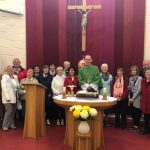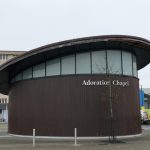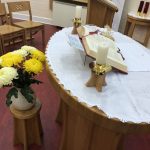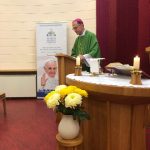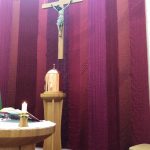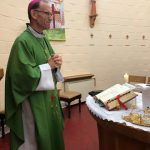Homily for Killaole Diocesan Eucharistic Adoration Committee, Shannon, October 13th, 2018
I welcome you all as we come together in Shannon as the Diocesan Eucharistic Adoration Committee. I thank you for your availability on this Diocesan Committeeand for the outstanding work you do in promoting this important prayer apostolate. This harvest time of the year, in looking back in thankfulness enables us toofferthe yearpastinto the hands of God as we look back and also look forward. This blend of the old and the new, of endings and beginnings, is so much part of the message of the New Testament. We need to keep both in view.
Not on bread alone…
In the Eucharist we look back in grateful thanksgiving to God for all He has done for us in Jesus Christ. The Eucharist also enables us to move forward as a community supporting one another. Moses in the Old Testamentcalls on the people to remember the time in the wilderness when they were hungry. In those times of scarcity the Lord provided for them. It was something that the people needed to remember when a time of plenty would come, when they reached the promised land. In such times its easy to forget the Lord who is the source of our blessings. Yet in times of plenty we need to remember that we do not live on bread alone; there are deeper hungers in our lives.
Life-giving bread
When Jesus provides us with bread, he is truly present, sharing our sorrows and difficulties, even our temptations and death. Yet, even death becomes a way leading to an ever more intimate union with Jesus in eternal life. In the St. Paul’sLetter to the Corinthians Paul emphasises that we must look with faith, not only on the living and life-giving bread but also with faith on our brothers and sisters as forming “one body” with us. Unless we recognise Christ in our neighbour, we will not know or recognise him when we receive in the Eucharist.
The Bread of Life – John Chapter 6
In the Gospel ofSt. John, chapter 6, Jesus uses very clear, unambiguous language insisting that it is only by eating the flesh and drinking the blood of the Son of Man that we can have the life He promised. In thatGospel reading Jesus presents himself as the one who can really satisfy our deeper hungers. He is the living bread come down from Heaven. It is particularly in the Eucharist that Jesus offers himself to us in food and drink to address our deeper concerns. He underlines the fact that if we do not eat the flesh of the Son of Man and drink his blood we cannot have life in us.
The Last Supper – Take and Eat
At the Last Supper Jesus gave himself to his disciples as food and drink. In every Eucharist he does the same for us. Receiving Jesus in the Eucharist means that we identify with the values by which He lived and died. When Jesus said to his disciples at the Last Supper “take and eat”, he was inviting them to stand with him. When we receive the bread and the cup in the Eucharist we too are declaring that we want to live by all that Jesus values andthereforewe drawlifefrom this.
The Hope of the Gospel – God is with Us
Reflecting on our situation today we are all very conscious of the distress we feel during the most anxious, trying, and dangerous experiences of life. What or who gives us direction when loved ones are stricken with illness, when our livelihood is in jeopardy and the future is dark? Faith in the Son of Man enables us to courageously cope with these challenges. The message of this Gospel therefore is one of hope.
Seeking direction in the confusion and choices of life
From time to time we all get the feeling that so much is swirling about us, hectic change, new ideas, new information, different approaches, everything seems to be in flux. We find it difficult to plan for the future. This causes its own difficulties because we live in an age when we like to think that we are in control and will determine what will and will not happen.
The liberating, stablizing power of Jesus in the Eucharist
There is also within us a hankering after stability and security, a feeling that we would like to know where the centre is and be close to the centre. In a busy hectic world Eucharistic Adoration has a special appeal. In the GospelsJesus was presented as weak and vulnerable, yet we know that the power of Jesus was rooted in his intimate relationship with God, his Father. The power which Jesus had was not an oppressive, dictatorial power, but a liberating and life-giving one. As we adore Christ in the Blessed Sacrament we have reminders of his vulnerability in the Sacred host. And yet here in the Sacred host we are at the centre, not just of our world but of the whole universe. Here we make contact with someone who does not change, someone who is always reaching out to us in love, listening to our stories, whether of sorrow or sadness, of joy and victory. Here we have someone who listens to our heartbeat, is familiar with our worries and anxieties, our concern about our children and grandchildren, someone who understands our disappointments and frustration. Through adoration of Christ in the Blessed Sacrament, we get a sense of history, a sense of the past and also future hope. We are enabled to put things in perspective, without either exaggerating or diminishing their importance. In the presence of Christ in the Blessed Sacrament we realise that we are not the ones who are in control, we do not possess the power which we might like to think we have and yet we have the power which comes from the fact that we are accepted, welcomed and loved by Jesus Christ.
Where do we draw inspiration from?
There are times when we wonder where certain people derive their inspiration and their ability to address difficult and demanding situations without being overwhelmed by them. I would just like to mention threepeople in particular who are known to yourselves. Significantly, allof them have visited Ireland and have been pilgrims to Our Lady’s Shrine at Knock.
Saint John Paul II
One was Pope John Paul II, now Canonised Saint. It was his longstanding custom to spend a very significant length of time in adoration before the Blessed Sacrament prior to celebrating Mass. There was something very special about seeing Christ’s vicar on earth in deep prayer and meditation before the Lord in the Blessed Sacrament. You sensed that the whole Catholic world was converging in the Holy Father as he brought the world, its people and its problems to Jesus Christ in the Blessed Sacrament. We are all aware of the energy that characterised his Pontificate as he travelled across the world to make Jesus Christ known and loved.
Mother Teresa of Calcutta
The other person is St.Teresa of Calcutta, also recently canonised. Some years ago she too visited Our Lady’s Shrine at Knock. The priest who accompanied her into the Apparition Chapel tells about the way in which as soon as she entered the Chapel she said “lead me to the Tabernacle” and there she spent some time in quiet prayer and adoration. Working with the poorest of the poor in Calcutta one could easily become discouraged and wonder whether any progress was being made. On one occasion an interviewer asked Mother Teresa whether she was having any success in working with the street children in Calcutta. Mother Teresa answered “God did not call me to be successful, he called me to be faithful”. Before spending a day among the poor of Calcutta Mother Teresa would spend time before the Blessed Sacrament. It was there that she derived her strength and realised that while the problems were huge she was not on her own and entrusted them to the one who had the whole world in his hand, Jesus Christ in the Blessed Sacrament. We are all aware of the impact which Mother Teresa has made across the world where she has influenced people of different faiths and of no faith at all.
Pope Francis
Many people spoke of the visit of Pope Francis to Knock as being the highlight of WMOF2018! The reason being the impact of the time of silent and reverent prayer of Pope Francis, the assembled congregation and the broadcast media before the Blessed Sacrament at the gable wall of the Shrine at the back of the Parish Church. The special prayerful and contemplative moment captivated and deeply touched so many.
Jesus and the Eucharist – Our anchor and stability
In a world where there is so much emphasis on hectic activity, achievement and success we need to get things in perspective. If Jesus Christ is not central in the way we think and plan then there is every possibility that we will become distracted and move off on byroads and tangents. In our culture it is difficult to be still; there is always a huge temptation to focus on things to be done, goals to be achieved. In the Old Testament the people were invited into the centre of God’s presence, into the Holy City of Jerusalem, the symbol of God’s absolute fidelity and unassailable strength.
Be still and know that I am God…
Sometime you might read and pray Psalm 46. In that Psalm we hear the words “be still and know that I am God”. For Christians, Christ in the Blessed Sacrament becomes the focal point for us. In the Eucharist we enter into the history of God’s love for us in sending his Son to take on our human weakness and our sinfulness. In the Eucharist we celebrate the death and resurrection of Jesus Christ. The Mass lasts for a little over half an hour. If we are to appreciate what takes place in the Mass there is an urgent need for reflection and silent prayer. This does not usually happen within the Mass itself and so in adoration we have an opportunity to be with Jesus Christ and appreciate what he has done, the gifts that he has given us as well as entrusting to Him the cares, worries and anxieties which we encounter on a daily basis. There is a sense in which every Mass ought to be prepared for and result in Eucharistic adoration.
Encouragment, blessings and good wishes
I commend, praise and encourageall of youwho have pledged yourselvesto adoration of the Blessed Sacrament here in the Diocese of Killaloe and to promote it by way of the work of this great committee. I am convinced that great blessings will result for families, individuals and all of the diocese. Congratulations and thank you for all your work and may your work and prayer apostolate continue to bear fruit in many ways the length and breadth of the diocese.
